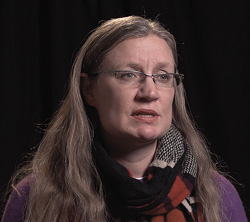2.3 A psychiatrist’s perspective
There will be an opportunity to explore a psychiatric definition of schizophrenia later in this course, and you will also look at some of the challenges with Insel’s approach. In the next activity, however, you will consider how a medical practitioner might first identify the possibility that an individual may need treatment for their mental health problem. GPs are often the first professional to be consulted when someone has an emerging mental health issue. A majority of these problems are termed ‘common mental disorders’, which include depression, anxiety and phobias. Another smaller category is that of ‘psychotic disorders’, which includes schizophrenia and bipolar disorder. Although GPs may treat conditions such as depression and anxiety at the primary care level, they are extremely likely to refer those thought to have conditions such as schizophrenia, bipolar disorder and other ‘psychotic disorders’ on to a psychiatrist for assessment and diagnosis.
Activity 4 Guidance on diagnosing psychosis
Read the Royal College of Psychiatrists and GPs’ ‘GP Guidance: Early Detection of Emerging Psychosis – What You Need to Know’ [Tip: hold Ctrl and click a link to open it in a new tab. (Hide tip)] so that you have some understanding of the context in which GPs operate.
As you read, make a note of the possible signs of psychosis, bearing in mind the description of Mandy’s situation.
Next imagine you are preparing initial ideas for a noticeboard about why it is important to detect possible psychosis early (and provide appropriate help) in order to assist in educating a group of people new to working in the mental health field. Use the sticky notes tool to list the key points you would want to highlight from the GP guidance document. Place the top three or four points in prominent positions on the noticeboard, so that these stand out.
Comment
You may have picked up a number of points from the guidance document. We, as course authors, would want to reinforce that early detection is important (and that suitable help should be sought). Three points (to highlight the need for urgency and appropriate care in this area of mental health) could be:
- ‘There is a 10% lifetime risk of suicide, usually within the first 5 years...’
- ‘88% of people with psychosis end up without a job, which is a path to social exclusion’
- ‘In the longer term, people with psychosis die 15–20 years prematurely on average, mainly from cardiovascular disorders’
Having now looked at the Royal College of Psychiatrists and GPs’ guidance for GPs, you next have the opportunity to hear from a psychiatrist on what they would be looking for when meeting up with someone like Mandy who is having unusual experiences. In the next two sections you will hear the perspectives of a psychological practitioner (in particular a clinical psychologist) and a social worker, and you will be able to compare their distinct approaches to Mandy’s situation.
Activity 5 A psychiatrist’s approach
In Activity 2 you heard a group of professionals discussing Mandy’s situation. You will now read more about the views of Dr Elizabeth Venables, the psychiatrist who featured in that discussion.
The psychiatrist’s view: Dr Elizabeth Venables

Pay attention to Dr Venables’s analysis of Mandy’s problem. Keep in mind what you have written about Mandy in Activity 1 (revisiting your notes if necessary) and view this not as a passive learning exercise, but as an active experience in which someone else in the room is giving their view on a situation for which you have already formed some opinions. As you read what they have to say, think about and note down ideas covering the following points:
- Where does the psychiatrist’s approach agree with yours?
- What has she introduced that had not occurred to you?
- What aspects of her approach would you like to challenge?
In the next section you will consider a different perspective on assessing mental health problems, that of psychological practitioners such as clinical psychologists.
